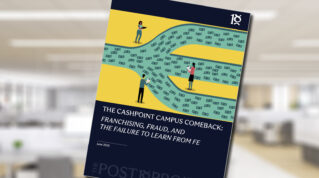The Department for Education has quietly delayed the introduction of the lifelong learning entitlement.
Students won’t be able to apply for LLE funding until September 2025, seven months after the planned February launch of the first LLE applications.
Teaching of courses funded through the LEE will now not start until at least January 2026, rather than September 2025.
In a letter sent to providers today, seen by FE Week, new skills minister Luke Hall said the Student Loans Company (SLC) needed more time to develop its systems.
“Having worked closely with the SLC on the delivery of its new LLE application and payments system, the government understands the great challenge of changing finance systems whilst at all costs ensuring a seamless transition for learners and providers,” Hall said.
It follows a prolonged full roll-out of the flagship scheme, which won’t be fully in place until at least 2027.
On its current timetable, full years of study of level 4 to 6 HE courses and higher technical qualifications will be available through the LLE from January 2026.
But its main selling point is the ability to access loan funding for shorter courses and modules.
Funding for some smaller courses currently funded through advanced learner loans will be available from January 2026, but the government plans for the bulk of modular courses to be available to learners in the 2027/28 academic year.
The Department for Education’s chief civil servant, permanent secretary Susan Acland-Hood, warned of “significant delivery challenges” to the LLE’s planned 2025 launch back in August.
Acland-Hood specifically highlighted SLC systems among possible delivery challenges at the time, stating: “The programme depends on good partnership with the Student Loans Company and the OfS [Office for Students] and their delivery of new systems and processes.”
Alex Proudfoot, chief executive of membership body Independent Higher Education, said: “The LLE represents a once-in-a-generation opportunity to transform the ways in which students learn and access financial support for learning. No-one likes to see delays, but it is essential that we get this right, and that students and providers experience a smooth transition to a new funding system, which commands confidence from day one.
“IHE has called for a system of funding by credit since 2015, so that more students across the country and from every background can access the high-quality short and modular courses that independent providers offer to industry in different specialist disciplines. A decade on, we can wait a few more months for the future to arrive.”
Hall plays it safe
Pushing back the initial LLE roll-out means the SLC can test its new application and funding systems with a smaller volume of students. Fewer people apply for courses starting in January than in September.
Hall said: “This phased approach allows SCL to test their systems with smaller volumes of applications in January 2026, so that we can more safely introduce the system and ensure its reliability ahead of the full academic year volumes in September 2026, and full modular roll out in September 2027.”
The delay also gives providers more to prepare, the new minister said.
Hall promised a “provider preparation guide” in the coming weeks.
The LLE is a new system of student finance, covering tuition and maintenance, for courses at levels 4 to 6 for students up to the age of 60.
The government has pinned its hopes on reversing the decade-plus-long decline in part-time learning and higher-level technical training on the policy.
Potential lifelong learners will now have to wait until September 2025 before accessing their online account which will show them how much loan funding they are entitled to, and which courses and modules they can spend it on.
The loan entitlement will be worth the equivalent of four years of undergraduate tuition fees – currently £37,000 – minus the amount of any past student loans.
Providers in the dark
Providers hoping to deliver LLE-funded courses are still in the dark about who can deliver precisely what, when, and how much they can charge.
For example, training providers currently delivering courses that are advanced learner loan funded, but will become LLE funded, are still waiting for details on how they can register with the Office for Students’ so-called “third category”. This isn’t expected until the summer of this year.
For independent training providers, the delay could mean more time for them to finally gain OfS approval and deliver LLE provision from day one.
Simon Ashworth, director of policy at the Association of Employment and Learning providers, told FE Week: “In a roundabout way, this delay should lead to a slightly more level playing field for all types of providers by reducing the period from the start of LLE to when ITPs will be able to join. AELP will continue to push for those providers who are ready to become [OfS] approved and join the LLE sooner rather than having to wait unnecessarily.”
Hall’s letter promises “further details on maintenance” despite the government announcing maintenance loans for LLE learners over a year ago.
Providers can expect details of an “additional entitlement for priority subjects and courses” in the coming months, Hall said today.
And a long-awaited technical consultation on funding for modular courses isn’t likely to take place until this summer.
A DfE spokesperson said: “We remain committed to rolling out the Lifelong Learning Entitlement in academic year 2025/26 and we believe that this phased approach is the best way to deliver for learners, providers and the existing student-finance system.
“The journey towards the LLE’s introduction is ambitious and we want the Student Loans Company and providers to have the preparation time they need to adapt their systems to be ready for launch.”

















Outstanding student loan debt has quadrupled every decade in the last 30 years. (at well over £200,000,000,000 now)
Those selling it tell you it that it facilitates lifelong learning, upskilling and that it will increase your earning power.
Yet in the university space, we’ve never had so many degree educated people and productivity, average ‘real terms’ wages and living standards have been stagnant for many years. It’s also triggered industrial scale grade inflation (who wants to pay tens of thousands for a 3rd after all, that’s a hard sell…).
Those that question it see it as a tax on aspiration in the same way that the national lottery is a tax on hope. It’s really quite easy to view it as a key factor in why there is an ever growing wealth divide. Those that can avoid loans interest will and in doing so can avoid the aspiration tax, instant headstart.
It a shame that no political party can bring themselves to confront it though, the prospect of selling off the good bits to institutional investors at a time of your choosing is just too alluring.